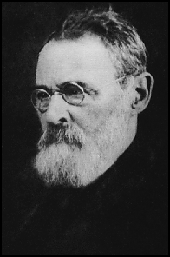Pavel Axelrod

Pavel Axelrod was born in Chernigov, Russia, in 1850. Deeply influenced by the writings of Mikhail Bakunin, he established a socialist group of students in Kiev. He also contributed to the radical journals, Worker and Commune.
In 1877 he joined the Land and Liberty. Three years later the group split into two factions. The majority of members, who favoured a policy of terrorism, established the People's Will. Axelrod and George Plekhanov established the Black Repartition group that rejected terrorism and supported a socialist propaganda campaign among workers and peasants.
Axelrod went with George Plekhanov to live in Switzerland and in 1883 they established the Liberation of Labour group.
In March, 1898, the various Marxist groups in Russia met in Minsk and decided to form the Social Democratic Labour Party (SDLP). The party was banned in Russia so most of its leaders were forced to live in exile. Axelrod became co-editor of a journal called Iskra. It was printed in several European cities and then smuggled into Russia by a network of SDLP agents.
At the Second Congress of the Social Democratic Labour Party in London in 1903, there was a dispute between Vladimir Lenin and Julius Martov, two of SDLP's leaders. Lenin argued for a small party of professional revolutionaries with a large fringe of non-party sympathizers and supporters. Martov disagreed believing it was better to have a large party of activists.
Julius Martov based his ideas on the socialist parties that existed in other European countries such as the British Labour Party. Lenin argued that the situation was different in Russia as it was illegal to form socialist political parties under the Tsar's autocratic government. At the end of the debate Martov won the vote 28-23 . Vladimir Lenin was unwilling to accept the result and formed a faction known as the Bolsheviks. Those who remained loyal to Martov became known as Mensheviks.
Along with Julius Martov, Pavel Axelrod, Leon Trotsky, Irakli Tsereteli, Moisei Uritsky, Noi Zhordania and Fedor Dan, Axelrod joined the Mensheviks. However, a large number of important figures in the Social Democratic Labour Party, including Gregory Zinoviev, Anatoli Lunacharsky, Joseph Stalin, Mikhail Lashevich, Nadezhda Krupskaya, Mikhail Frunze, Alexei Rykov, Yakov Sverdlov, Lev Kamenev, Maxim Litvinov, Vladimir Antonov, Felix Dzerzhinsky, Gregory Ordzhonikidze and Alexander Bogdanov joined the Bolsheviks.
An opponent of the First World War, Axelrod worked with Julius Martov, Vladimir Antonov and Leon Trotsky, to produce the internationalist newspaper, Our World.
After the February Revolution Axelrod returned to Russia but was too late to stop some Mensheviks joining the Provisional Government. He strongly criticized those Mensheviks such as Irakli Tsereteli and Fedor Dan who now supported the war effort. However at a conference held on 18th June, 1917, he failed to gain the support of the delegates for a policy of immediate peace negotiations with the Central Powers.
After the October Revolution, which Axelrod called a "historical crime without parallel in modern history", he toured the world rallying socialist opposition to the Bolsheviks. Pavel Axelrod died in 1928.
